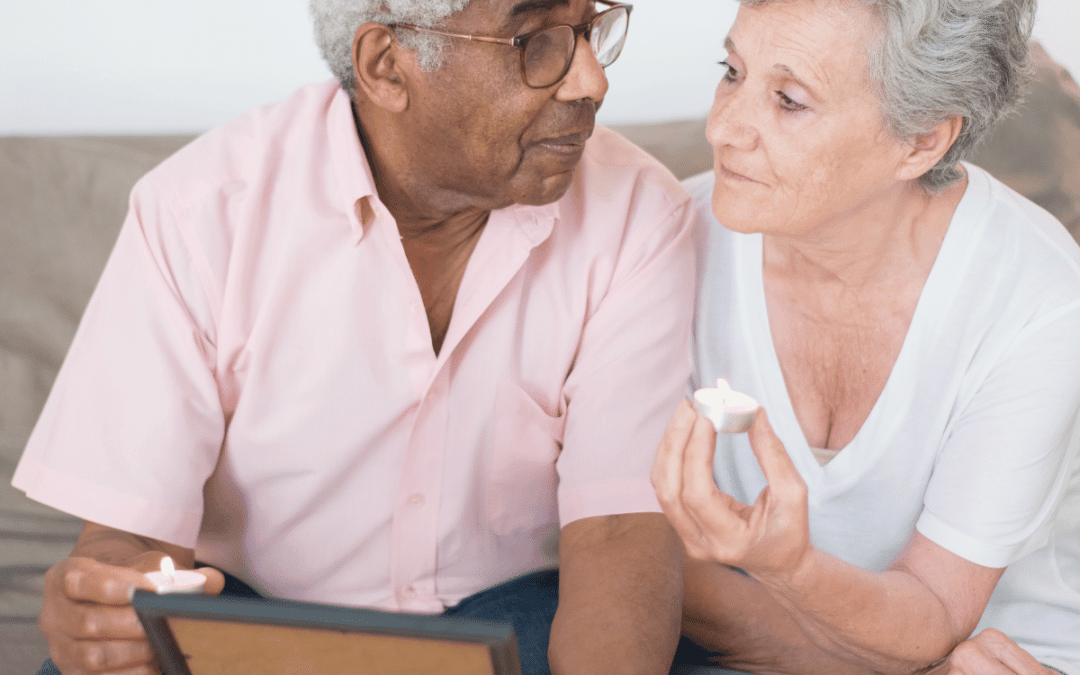Grief is a natural and universal emotion that knows no age boundaries. Growing older provides an accumulation of happy memories and experiences, but there can also be times when loss occurs, and the grief that follows can be hard to deal with alone. If you are currently experiencing grief in your life then it is important to remember that your feelings are valid, your experiences are shared, and you are not alone.
What is Grief?
Grief is a response to loss. It’s the emotional and psychological reaction to the absence of something or someone held dear. While grief is most commonly associated with the death of a loved one, it can also be triggered by various other forms of loss, such as:
- The end of a significant relationship or marriage.
- The loss of a job or financial security.
- A diagnosis of a life-altering illness.
- The death of a beloved pet.
- The loss of a dream or aspiration.
Grief can manifest as a complex mix of emotions, including sadness, anger, guilt, confusion, and even relief. It’s not a linear process, and there is no “right” or “wrong” way to grieve. Each person’s journey through grief is unique, shaped by their individual experiences, beliefs, and support systems.
What are the Stages of Grief
There was a basic framework that was introduced by Elisabeth Kübler-Ross called “Five Stages of Grief.” This model is ingrained in our culture and details that when going through grief, people experience denial, anger, bargaining, depression, and acceptance. However, it is found that this is not science based and has been criticised for lacking depth and evidence.
There is no checklist for navigating grief and if you find that you are not going through the stages mentioned above, it does not mean that you are grieving in the wrong way. It is important to pay close attention to your own grieving process and understand your own physiological and emotional needs. There is certainly no one size fits all answer to grief, however theories like The Five Stages of Grief, and others that you may find documented can help you to contextualise your own experience, and find ways of coping.

Common Responses to Grief
You may experience some or all of the five responses detailed in the Kübler-Ross model, but there are also a whole host of other responses which can be split into emotional, physical and social responses. Though the responses detailed below are the most common, once again, you may find yourself dealing with responses which aren’t covered.
Emotional Responses to Grief
Sadness
Sadness is one of the most prevalent emotions in grief. It’s a deep sense of sorrow and loss that can feel overwhelming at times.
Anger
Grief can lead to feelings of anger. This anger can be directed at various targets, including the person who passed away, oneself, medical professionals, or even a higher power.
Guilt
It’s common for people to feel guilty after a loss, especially if they believe they could have done something differently to prevent it. Guilt can be irrational but still deeply felt.
Anxiety
Grief can trigger anxiety and worry about the future. You might be anxious about how you’ll manage without the person or thing you’ve lost.
Confusion
Grief can be disorienting, causing feelings of confusion and an inability to concentrate or make decisions.
Numbness
Some people experience a sense of emotional numbness, where they feel disconnected from their emotions or the world around them. This numbness can serve as a coping mechanism.
Physical Responses to Grief
Fatigue
Grief can be physically exhausting. Many people experience overwhelming tiredness as they navigate the emotional and mental aspects of grief.
Appetite Changes
Grief can affect your appetite. Some individuals may lose their appetite and have difficulty eating, while others may turn to food for comfort.
Sleep Disturbances
Grief can disrupt sleep patterns, leading to insomnia or excessive sleeping. This can further exacerbate feelings of fatigue.
Physical Symptoms
The stress of grief can manifest in physical symptoms such as headaches, muscle tension, and gastrointestinal issues.
Social Responses to Grief
Withdrawal
Grief can lead to social withdrawal, as you may feel like isolating yourself from others who don’t understand your pain.
Seeking Support
On the flip side, some individuals actively seek support from friends, family, or support groups. Talking to others who have experienced similar losses can provide comfort and validation.
Changes in Relationships
Grief can strain relationships, as people may not always know how to support someone who is grieving. It’s essential to communicate openly with loved ones about your needs.
Nostalgia
Grief often brings forth a sense of nostalgia, where you reflect on memories and moments shared with the person or thing you’ve lost.
Understanding these common responses to grief can help you navigate the process with greater awareness and self-compassion.
Strategies for How to Deal With Grief
Coping with grief is a deeply personal journey, and as mentioned before there is no one-size-fits-all approach. However, there are several strategies and techniques that can help individuals to navigate the challenging process of grieving. Here are some ways to cope with grief.
Seeking Support
You don’t need to go through grief alone. Reach out to friends, family members, or support groups who can provide a listening ear and emotional support.
You might also consider speaking with a grief counsellor or therapist who specialises in helping individuals cope with loss. At Little Croft residential care home we can help guide you in finding support or provide respite care services if you feel like you need to spend a little time with people who may be experiencing, or have already experienced similar feelings.
Join a Grief Support Group
Building on seeking support, support groups consist of individuals who have experienced similar losses. Sharing your feelings and experiences with others who understand can be immensely comforting.
Find a Way to Express Your Emotions
It is essential to allow yourself to feel and express your emotions, whether it’s through talking, writing in a journal, or engaging in creative outlets like art or music.
Bottling up emotions can prolong the grieving process and make it more challenging to heal.
Prioritising Self-Care
Prioritise self-care practices to nurture your physical and emotional well-being. Ensure you’re getting enough rest, maintaining a balanced diet, and engaging in regular physical activity.
You can practice relaxation techniques such as meditation, deep breathing, or yoga to reduce stress and anxiety. You can keep trying different self care techniques until you find something that works for you, and gives you the motivation to make time for yourself.
Remembering and Honouring What you are Grieving
Coping with grief isn’t about trying to forget what you are grieving, and it can often help to find a meaningful way to commemorate and remember the person or thing you’ve lost. You could create a scrapbook, hold a memorial service, or plant a tree in their memory.
Celebrate their life and the positive impact they had on yours.

Give Yourself Time
Grief doesn’t have a set timeline. It’s crucial to be patient with yourself and allow the healing process to unfold at its own pace. There’s no rush to “move on.”
Reach Out for Professional Help
If you find that your grief is overwhelming, interfering with your daily life, or leading to persistent depression or anxiety, consider seeking professional help. A therapist can provide specialised guidance and support based on the responses to grief that you are going through.
Support Your Physical Health
Grief can take a toll on your physical well-being. Ensure you’re eating nutritious meals, staying hydrated, and getting regular exercise, even a short walk can help. It is important to do what you can in order to not fall into a slump. This can damage your physical, and mental health.
Adequate sleep is also crucial for managing emotions, so establishing healthy sleep routines can help you make you feel better.
Maintain Social Connections
Although grief can make you want to withdraw from social interactions, try to maintain connections with friends and family who care about you. Isolation can intensify feelings of sadness.
Accept Your Grief
Remember that grief is a natural response to loss, and it’s okay to grieve. Allow yourself to experience the full range of emotions that come with it.
Coping with grief is a challenging and often long-term process. It’s important to be gentle with yourself and recognise that healing happens gradually. The key is to find the support and coping strategies that work best for you as you navigate the path toward healing and acceptance. Feel free to contact our supportive team if you need any guidance.

